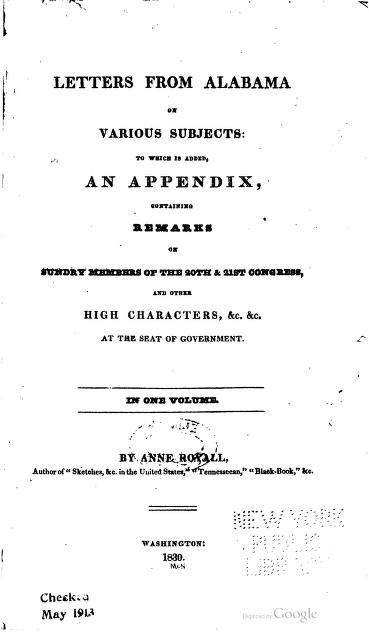Anne Royall took on many roles during her lifetime: wife, widow, traveler, author, newspaper editor, and prolific letter writer. She was also convicted in 1829 of being a "common scold", a sort of public nuisance, after her encounters with some evangelical Presbyterians in Washington, D.C. Royall was fined $10, which was paid by two local newspaper editors. Details can be found in her Encyclopedia of Alabama and Wikipedia entries.
Between 1826 and 1831 Royall published several volumes about her travels, primarily in the South. Her most famous is probably her second, Letters from Alabama on Various Subjects that appeared in 1830. The first 14 letters actually describe her journey from Virginia through Lexington and Bowling Green in Kentucky and Nashville and Fayetteville in Tennessee. Once she arrived in Alabama, she visited Huntsville, Melton's Bluff, Courtland, Moulton and Florence. The first letter was dated November 8, 1817; the last, from Huntsville on June 8, 1822. The letters were addressed to "Matt" Dunbar, a young lawyer friend in Virginia.
Thus Royall visited Alabama during its territorial and early statehood periods. In all of her travel books she wrote in a lively style and with a sharp wit. She details the landscapes she saw, the people famous and common she met and how they lived. In one of the Alabama letters she describes a meeting at Melton's Bluff in January 1818 with General Andrew Jackson, whom she greatly admired. She noted that he was nursing members of the Mitchell family, white and black, who were suffering from fever.
Royall was born on June 11, 1769, near Baltimore. In 1797 she married Major William Royall, a wealthy Revolutionary War veteran. He died in 1812 and since they had no children, Anne inherited his 7000 acres and seven slaves. She sold the land and four of the slaves and began her travels in the South. The will was overturned in 1819, and she was left without income. By 1826 she had become one of the many authors of popular travel books in the United States.
In 1831 she settled permanently in Washington, D.C., and published two newspapers that focused her caustic wit on politicians and fraud and waste in government. Royal died October 1, 1854, and is buried in Congressional Cemetery.
Anne Newport Royall's travel books have left us an important record of the areas through which she traveled, including Alabama. In those early years people were pouring into the new territory and then state seeking opportunities in a frontier with vast available lands and few restrictions from weak local and state governments. The letter excerpted below was written from Florence on July 15, 1821, and displays her wit about the "unaccountable" number of physicians that "flock to this country."
Of course, these doctors were coming to seek new opportunities just like everyone else. Many had probably left towns or communities with too many doctors; after all, regulation of medical practice at this time was almost non-existent. Toward the end of this part, she notes, "Many of these physicians, however, are becoming planters, by which they will doubtless make their bread."
And indeed some doctors did. Dr. Joshua Sanford Wilson--also a politician-- developed a plantation in Clarke County and built its mansion between 1846 and 1851. The structure is known today as the Wilson-Finlay House. Another physician-planter-politician in Alabama was Alexander Williams Mitchell who began construction of Belle Mont in the 1820s. His plantation of more than 1700 acres was located in what is now Colbert County.
Written from Florence on July 15, 1821 [p. 148 of the Letters]





No comments:
Post a Comment